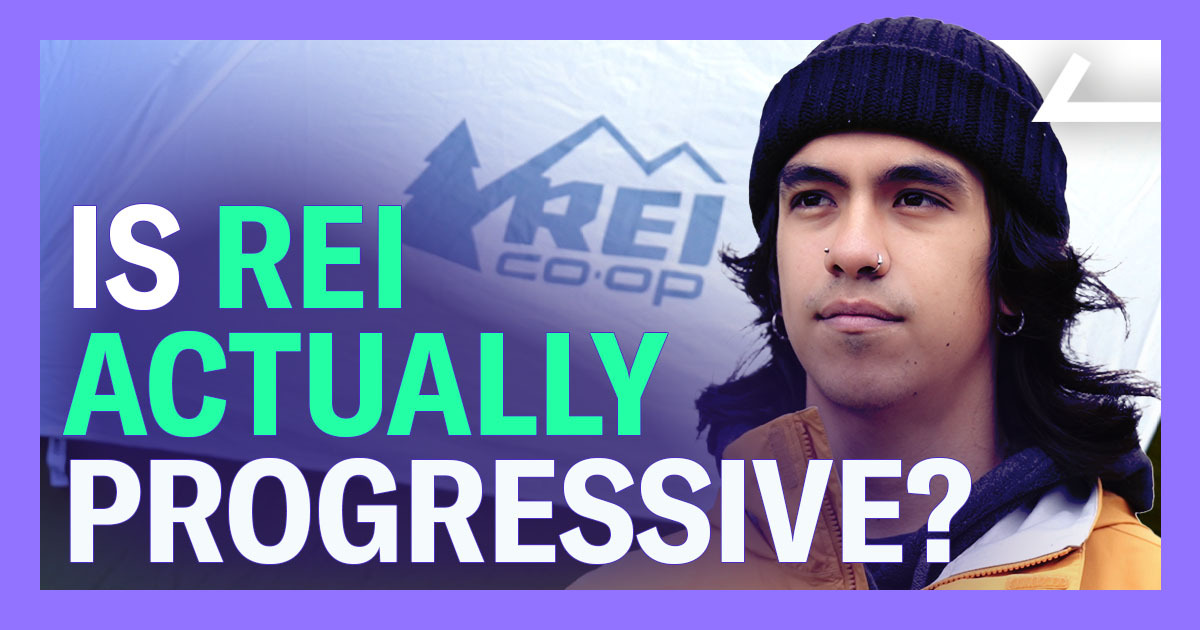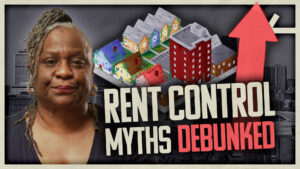Produced and edited by Libby Rainey and Meg Herschlein
REI workers in California are unionizing. They’re the first REI store to file for a union election following REI SOHO’s victory. REI claims to be a progressive company but employees say it’s a facade. They’re understaffed, overworked & face racism from managers. We spoke with workers at REI. Below is a full transcript of the video.
Hannah Smith: REI touts itself as this progressive company, it touts itself for its values and then is not willing to follow through on them when it comes to the rights of its workers.
Jules Geritz: And I don’t understand how you can be a forerunner in a progressive movement if you’re not also on the side of labor rights.
Hannah: I think unionizing is in agreement with the co-op way—REI’s stated values. One of them is courageously embracing change and that’s what we’re hoping to do. Right now, we’re trying to hire new folks and we can’t, because the floor of where our wages are is just too low to incentivize people to come work at REI.
Jules: There’s quite a discrepancy in the amount that each of us earn.
Marcos Santos: I know there were a couple of people that started after I did who were hired in the same position, and whether it’s favoritism, whether it’s race, anything like that, got paid quite a bit more than I did, quite a bit more than my other co-workers, my other brown co-workers that were hired at the same time I was.
Hannah: To be really transparent, I’m under the year mark, I’m outearning someone who’s been at the store for 10 years.
Marcos: We are constantly understaffed and so overworked.
Hannah: We’re so understaffed that part-time employees are working 40 hours a week.
Jules: I would like to see all of the people who are working effectively as full-time employees earning the same benefits I earn as a full-time employee. I get better rates of part-time off accrual, I get better sick pay accrual, I get better health benefits. If there’s a holiday, I get paid more just for it being a holiday. And if you’re working full-time but only getting part-time benefits because you’re classified as a part-time worker, that to me doesn’t seem fair.
Hannah: We want accountability for HR, right? So we’ve had, like at all workplaces, complaints of sexual harassment, and instances of racism, and the question is: who is overseeing how that is handled?
Marcos: I go day by day wondering whether or not somebody will call me by the right name. I get called many different names, whether it’s my fellow brown co-workers names or if it’s just a made up Hispanic name that somebody makes up on the spot. With union representation, I really think that I’ll be able to hold people accountable for any sort of injustices they caused against me or any of my fellow co-workers, which is just outrageous that we’re just letting pass by with a sorry and a pat on the back.
One of their anti-union tactics were to leave some fliers on employee’s cars, on employee’s windshields during the work day, which is extremely invasive.
Hannah: It starts with “Did you ask the company what you wanted before deciding the union was a better option to get what you want?” This is the essence of it all to me, right? Of course we have, over years and years and decades that preceded me.
Jules: “Unions may pit workers against companies.” If we were mad at the company, if we were unsatisfied with the company, we’d just leave. But we’re invested in this company. We want to come together and collaborate with C-suite executives and with our store managers in a way that really hasn’t been offered to REI employees.
Marcos: When SOHO first unionized, they had a podcast where they had a land acknowledgment act and they talked about their pronouns, which has never been done in a REI podcast before.
[REI Podcast audio]: For those of you who I have not had the chance to meet, I use he/him pronouns and I’m speaking to you today from the traditional lands of the Coast Salish peoples.
Marcos: You could tell they were just doing that because REI SOHO unionized and then that was their response, “oh, we’re doing better now, we’re more woke” or something.
[REI Podcast audio]: So when people ask why don’t we support unions, my answer is simple: We do not oppose unions, it’s that we don’t believe, I do not believe, that introducing a union is the right thing for REI.
Jules: It does a great job of illustrating the progressive front that REI puts up in terms of wanting to be an ally, wanting to stand by women, and yet that progressive voice is lost when it comes to the welfare and well-being of their workers. They say they care about making sure their workers are well, and yet, when talk of a union comes in, suddenly they bring up dues and they focus on ‘you might lose your health care benefits,’ and all of these ideas that are just nonsense.
Hannah: How much of REI’s core values that it was established with in 1938 are still there for real, and how much of it is virtue signaling to its customer base? How much of it is a veil that covers what is underneath—actually an entire corporate structure.
Marcos: Who knows what’s to come from this election now that REI SOHO unionized and we get the Bay to unionize—it just really allows REI across the nation to really stand up for what they believe in and to use their voice that they have.
Hannah: If you want your employees to be stewards of the co-op, then you should abide by what the majority of them at the store want, which is to be in a union. It’s that simple.
Videography by Barbara Ve



